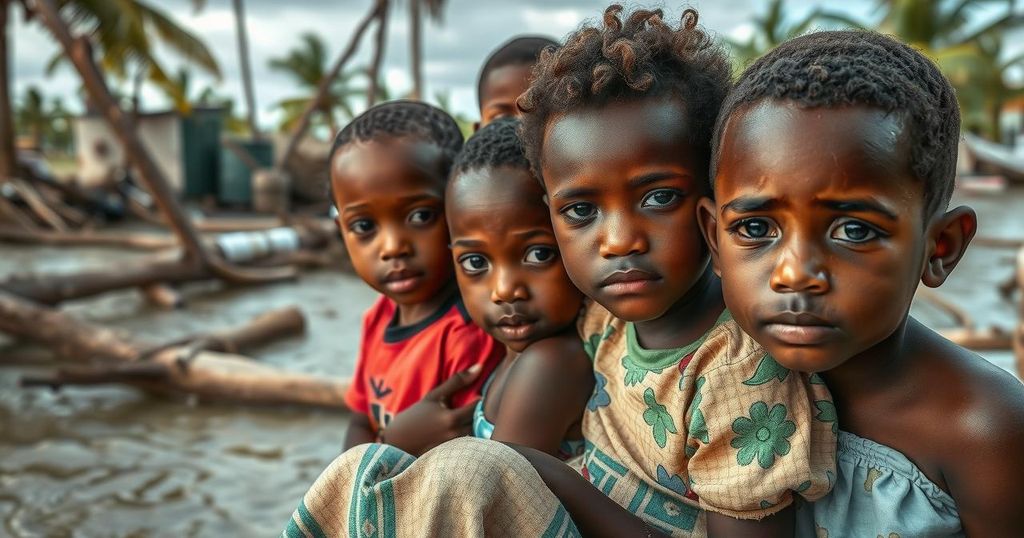Tropical Cyclone Chido Devastates Mozambique, Affecting 90,000 Children
Tropical Cyclone Chido has severely impacted northern Mozambique, affecting over 90,000 children and damaging tens of thousands of homes. With 186,000 classrooms destroyed and significant health infrastructure damaged, the humanitarian crisis has deepened in an already vulnerable region facing conflict and disease outbreaks. Relief efforts are underway, but challenges such as limited supplies hinder the response.
Tropical Cyclone Chido recently struck northern Mozambique, significantly affecting communities in Cabo Delgado province. The UN Children’s Fund (UNICEF) reported that over 90,000 children were impacted, with current assessments indicating that approximately 35,000 homes were destroyed or damaged, displacing thousands of families. The cyclone also devastated educational and health infrastructure, destroying at least 186,000 classrooms and impacting 20 health facilities in the region.
The cyclone made landfall near the city of Pemba, resulting in widespread destruction, including damaged electricity and communication systems. “Mozambique is considered one of the most affected countries in the world by climate change and children were already experiencing several life-threatening emergencies before Cyclone Chido, including conflict, drought, and disease outbreaks,” stated Mary Louise Eagleton, UNICEF Representative in Mozambique.
The humanitarian situation is dire, with Cabo Delgado having faced more than seven years of conflict, leading to over 1.3 million internally displaced individuals, predominantly women and children. The cyclone exacerbated these existing challenges, as many families faced renewed adversity after attempting to rebuild their lives. Additionally, Nampula and Niassa provinces also suffered from the cyclone, leaving over 25,000 families without electricity and damaging essential water facilities.
The World Health Organization (WHO) has deployed experts to assess health needs in the affected regions, especially in light of an ongoing cholera outbreak, heightening concerns about public health deterioration. Within 48 hours, the UN refugee agency (UNHCR) initiated relief efforts in Pemba, delivering essential items to over 2,600 individuals in need. Preliminary assessments suggest about 190,000 individuals urgently require assistance, with significant damage reported across rural areas.
UN Secretary-General António Guterres stated that UN teams are actively engaged in providing emergency assistance and are prepared to scale support, as required. Nevertheless, response efforts are being hindered by limited supplies, prompting the allocation of $4 million for the immediate humanitarian response.
Furthermore, the World Food Programme (WFP) anticipates that nearly 3.3 million people will face ‘crisis’ or higher levels of food insecurity in Mozambique next year and will increase efforts to assist those most affected by the cyclone. Cyclone Chido has also caused considerable destruction beyond Mozambique, affecting areas in Mayotte and southern Malawi, prompting ongoing monitoring and coordination efforts by local partners.
The article addresses the significant impact of Tropical Cyclone Chido on the northern province of Mozambique, particularly highlighting the consequences for children, homes, and essential infrastructure. It draws attention to the already challenging humanitarian context in which the cyclone struck, with ongoing conflicts, health crises, and climate change implications. Government and UN agencies, including UNICEF and WHO, are coordinating relief efforts to provide immediate assistance to those affected by the cyclone, underlining the critical importance of timely humanitarian responses in the face of natural disasters.
In summary, Tropical Cyclone Chido inflicted severe damage on northern Mozambique, particularly affecting children and essential community infrastructure. The devastation exacerbates existing humanitarian challenges in the region, which already suffers from conflict and disease. Current efforts by UN agencies and local partners are focused on delivering essential relief and assessing ongoing needs, yet the situation remains urgent as affected communities face compounded vulnerabilities. Proactive measures and international support are crucial to address the immediate disaster response and long-term recovery for those impacted by Cyclone Chido.
Original Source: news.un.org




Post Comment